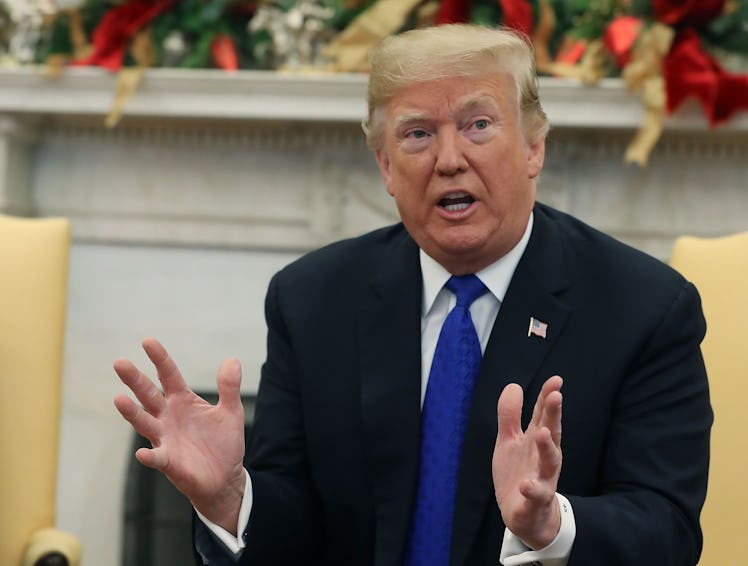
The Possibility Of Indicting A President Is A Lot More Complicated Than It Seems
On Wednesday, Dec. 12, as President Donald Trump's former personal attorney Michael Cohen was sentenced to three years in prison, he implicated the president in crimes he allegedly committed during the 2016 presidential campaign. Though Trump vehemently denied any involvement and hasn't been officially accused of or charged with any crimes, it brings up the long-standing debate of what legal ramifications might be in store for the commander-in-chief as the FBI investigation into possible collusion with Russia heats up. So, can a president be indicted while in office? The short answer: There is no short answer.
In one sense, no, a president can't be indicted in office. This is based on precedent and standing Department of Justice (DOJ) guidelines, which hold that doing so is unconstitutional. However, there appear to be no laws that explicitly forbid indicting a president, and some legal scholars argue that indictment is possible.
In 2000, the DOJ upheld its 1973 memo (released ahead of the resignation of President Nixon) which held, "The indictment or criminal prosecution of a sitting President would unconstitutionally undermine the capacity of the executive branch to perform its constitutionally assigned functions." In other words, issuing an indictment while a president is in office would make it too hard for the president to go about his important day-to-day work, so it would need to wait until the end of the presidency. In fact, this is one of at least four such DOJ memos laying out the department's position on this, The Atlantic writes, with three of them holding this position. But importantly, this protocol doesn't necessarily outlaw the practice, it just dictates the DOJ position.
As former federal prosecutor Renato Mariotti told me in an interview for an August Elite Daily article, "I just expect that Mueller would issue a report regarding impeachment," and avoid an indictment per that guideline.
Moreover, federal prosecutors like Mueller are afforded discretion in whether, when, and what they ultimately charge. As former solicitor general Neal Katyal argues in a May 2018 op-ed in The New York Times, the special counsel regulations were written to account for unforeseen situations like these, and a loophole in these rules would allow Deputy Attorney General Rod Rosenstein to override the DOJ indictment protocol.
Some politicians are already making moves to revisit the indictment question. On Wednesday, Dec. 12, Rep. Adam Schiff, the top Democrat on the House Intelligence Committee, called for a review on this DOJ ruling in light of the developments.
And Katyal noted in a Twitter thread on Dec. 12 that even if the DOJ doesn't move on charges, other state-level prosecutors might be able to — and it appears the incoming New York attorney general has their eye on that very thing.
Beyond the technical procedures, constitutionally, some argue that the framers never intended for the president to be exempt from punishment. Harvard Law Professor Laurence H. Tribe wrote in a Dec. 10 Boston Globe op-ed that not having the power to indict a sitting president would be unconstitutional. He references the U.S. Constitution (Article 1 Section 3, Clause 7, for those of you reading along at home), which states: "Judgment in Cases of Impeachment shall not extend further than to removal from Office ... but the Party convicted shall nevertheless be liable and subject to Indictment, Trial, Judgment and Punishment, according to Law." In other words, impeachment does not preclude or exempt an officer from further legal ramifications — and in fact, such actions are called for. Because a former president removed or resigned from office could still be pardoned by his successor (as happened with Nixon), charging a president in office is the only way he could face punishment.
"It's crazy to assume that the framers of the impeachment power would have created a system in which even the most criminally corrupt president could permanently escape full accountability," he wrote in the Globe.
As to whether a prosecutor would indict, some legal scholars, The Atlantic adds, point to the nature of any wrongdoing relevant to the role of the president, and how urgent prosecution would be, such as would compromise him or threaten national security.
So, indicting a sitting president is anything but a settled matter and there is no consensus if a prosecutor (Mueller, anyway) actually could, or under what circumstances, given competing DOJ rules. Certainly, it would be a break-glass-in-case-of-emergency measure, and as of now, there's no telling whether prosecutors will regard whatever they find as such.